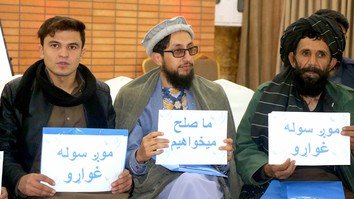HERAT -- More than 100 women representing Herat, Farah, Ghor and Badghis provinces at an event in Herat city called for the increased participation of women in the peace process.
The January 9 gathering, titled "Women as Pioneers of Peace", was organised in partnership with the United Nations Assistance Mission in Afghanistan (UNAMA).
The participants sent their written demands and concerns about the peace process to UNAMA, which in turn will share them with parties taking part in the peace process.
"Conditions set forth for peace talks by women of the western region are that women's fundamental rights be preserved, women should not be deprived of getting an education, victims of war shall not be forgotten, the Constitution may not change and women's achievements in the past two decades should not be overlooked," the statement says.
![The women participating in the gathering in Herat demanded that their voices be heard. [Omar]](/cnmi_st/images/2020/01/15/22007-pioneers__1_-585_329.jpg)
The women participating in the gathering in Herat demanded that their voices be heard. [Omar]
![More than 100 women from four western provinces gathered in Herat city on January 9 to declare their support for the peace process. [Omar]](/cnmi_st/images/2020/01/15/21995-w_1-585_329.jpg)
More than 100 women from four western provinces gathered in Herat city on January 9 to declare their support for the peace process. [Omar]
The peace talks are at a critical junction and Afghans should not miss the opportunity, said Sakina Hussaini, a member of the Herat provincial council and a participant of the event.
"We women call on the United States of America, the Afghan government and the Taliban to respect women's achievements and not to overlook their role in the peace process," she said.
"All the affected women ask for compensation from parties to the conflict, especially the Taliban," she said.
"Women have seen great trouble during the war, and they are in need of help," Hussaini said. "Those who have killed the breadwinners of families ... must give compensation [to the families]."
"Women are fed up with war and losing their loved ones, and they want parties to the conflict to immediately agree on a ceasefire," she added.
Preserving women's rights and achievements
The women participating in the gathering demanded that their voices be heard.
"One of our main concerns is that women's achievements and rights could be overlooked in peace talks," said Arzo Azizi, a lecturer at Herat University and a participant of the event.
"Afghan women have made numerous achievements over the past almost two decades, and they have reached high positions," she said. "We never want these achievements to be compromised in political games."
"We women want peace," she said. "But it needs to be a peace that doesn't violate anyone's rights."
Afghan women have made unprecedented sacrifices in the war for more than 15 years, said Nooria Ahmadi, a resident of Ghor Province.
"Women in Ghor Province want the war to end and to ensure peace in the country," she said. "Things that women have tried hard to achieve shouldn't be overlooked. Parties to the peace talks need to pay attention to the rights of members of every walk of society, especially families of war victims."
"We are very hopeful for peace talks, and we believe that a lasting peace will come to the country," she said.
Women want to take part in the peace talks so that they can directly raise their demands and concerns with the negotiating parties, said Saleha Muhammadi, a resident of Keshk Rabat Sangi District, Herat Province, and a participant in the event.
"Women in Afghanistan have suffered in the conflict, and they have made sacrifices," she said. "After men lost their lives in the conflict, women had to take over responsibility for the family and they have worked under difficult conditions to earn an income to feed their children."
Afghan government 'stands with women'
"The government stands with women, and it has always listened to their voices," said Munesa Hasanzada, the deputy governor of Herat. "We believe that women's concerns and demands about the peace process are valid, and we try to share their demands with the international community and parties involved in the [peace] talks."
The Afghan government has provided women the opportunity to strive, she said, promising that the government will continue to support them.
"Afghan women's rights and achievements will not be compromised, and the Taliban should respect women's demands in the peace talks," she said. "The government won't agree to a peace that ignores women."
All women oppose war and will no longer allow the Taliban and other groups to further harm civilians and destroy Afghanistan, said Masuda Karukhi, a representative of Herat Province in the Wolesi Jirga.
"The Taliban are not happy with women's participation in peace talks, but they have to know that Afghan women are not in the position they were 20 years ago, and they must be able to claim their rights from all the parties," she said.
"Women don't have to wait for what others decide for them and observe things from afar," Karukhi said. "Women have raised their voices, and they won't allow others to determine their fate."
The Afghan peace process requires the participation of members of all walks of life, she said.
"Women make up half of Afghanistan's population, so if their role is ignored in the peace process, it will mean that half of the Afghan people aren't represented in the process," she said.








Everything needs to be based on the Islamic Sharia law, and neither against the Sharia law nor the Afghan culture.
Reply2 Comment
The people of Herat are hard working, they have got talents in everything and they react to the issues of Afghanistan on time.
Reply2 Comment